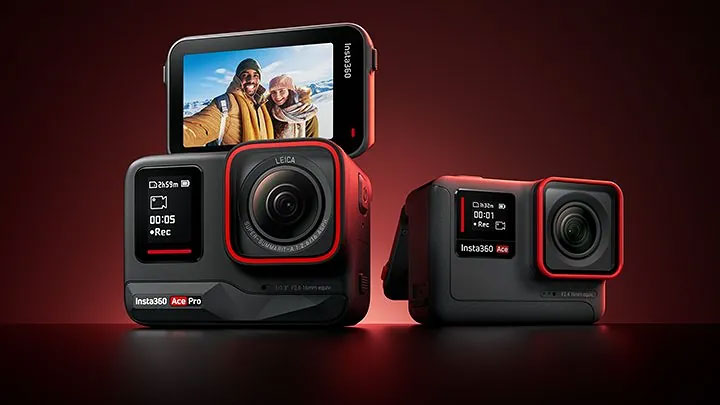
Get the INSTA 360 ACR PRO from AMAZON.COM | B&H Store
Let’s compare the Insta360 Ace Pro with the Insta360 Ace. The sensor size of both cameras differs. The Insta360 Ace Pro features a 1/1.3″ sensor, while the Insta360 Ace is limited to a smaller 1/2″ sensor. There’s also a difference in the lenses used. The Ace Pro uses a Leica-branded lens, whereas the Ace uses a general lens. Surprisingly, the aperture of the Leica lens on the Ace Pro is f/2.6, whereas the Ace, which uses a general lens, has an aperture of f/2.4.
| Feature | Insta360 Ace PRO | Insta360 Ace |
|---|---|---|
| Sensor Size | 1/1.3″ sensor | 1/2″ sensor |
| Lens | Leica-branded lens | General lens |
| Aperture | f/2.6 | f/2.4 |
Let’s compare the video resolution of the Insta360 Ace Pro and the Insta360 Ace.
The Insta360 Ace Pro offers a maximum video resolution of 8K at 24 frames per second (fps), and it can record 4K videos up to 120 fps. It also features a PureVideo mode, which allows you to record videos up to 4K at 30 fps. This mode captures excellent low-light video with the help of a dedicated AI chip.
| Feature | Insta360 Ace Pro | Insta360 Ace |
|---|---|---|
| Maximum Video Resolution | 8K at 24 fps | 6K at 30 fps |
| 4K Video | Up to 120 fps | Up to 120 fps |
| PureVideo Mode | Yes (4K at 30 fps) | Yes |
| Photo Format | JPEG and DNG raw files | JPEG and DNG raw files |
| Log Profile | Not available | Not available |
Both cameras have an excellent video capabilities, but the Ace Pro stands out with its larger sensor, better lens and advance AI features . However, both cameras lack a log profile for video recording.
On the other hand, the Insta360 Ace is limited to 6K video recording at up to 30 fps, and 4K can be boosted to 120 fps. It also has a PureVideo mode. For still images, both cameras offer the same resolution, despite the difference in sensor size. The video format is limited to MP4, but for photos, you can have JPEGs from both cameras as well as DNG raw files, which can be exported to the app or studio. There is no log profile available in both cameras while you are recording videos with either the Ace Pro or the Ace.
| Feature | Insta360 Ace Pro | Insta360 Ace |
|---|---|---|
| Maximum Video Bitrate | 170 Mbps | 170 Mbps |
| Exposure Value | +/- 4 EV | +/- 4 EV |
| ISO Range | 100 to 6400 | 100 to 6400 |
| Shutter Speed (Photography Mode) | 1/8000s to 120s | 1/8000s to 120s |
| Shutter Speed (Video Mode) | 1/8000s | 1/8000s |
| White Balance | 2000 to 10000 Kelvin | 2000 to 10000 Kelvin |
| Audio Modes | Noise reduction, Stereo, Directional focus | Noise reduction, Stereo, Directional focus |
| Weight | 179.8 grams | 176.8 grams |
| Dimensions | 71.9mmx52.15mmx38.5mm | 71.9mmx52.15mmx38.5mm |
| Storage | Supports microSD cards up to 1TB | Supports microSD cards up to 1TB |
The maximum video bitrate of both the Insta360 Ace Pro and the Insta360 Ace is the same at 170 Mbps. The exposure value is also identical at +/- 4 EV. In terms of ISO range, both cameras offer a range from 100 to 6400. Despite this limited ISO range, the PureVideo feature in both cameras captures excellent low-light videos. The shutter speed ranges from 1/8000 of a second to a maximum of 120 seconds in photography mode. In video mode, it’s 1/8000 of a second and depends on the frames per second required by the AI processor or limited by the user.
The white balance ranges from 2000 to 10000 Kelvin. In terms of audio, both cameras offer noise reduction mode and stereo and directional focus modes. The weight of both cameras is almost the same, with the Ace Pro weighing 179.8 grams and the Ace weighing 176.8 grams. The dimensions of both are the same. Neither camera has built-in storage, but they support microSD cards up to one terabyte.
| Feature | Insta360 Ace Pro | Insta360 Ace |
|---|---|---|
| Battery Capacity | 1650 mAh | 1700 mAh |
| Runtime | 100 minutes at 25°C | 100 minutes at 25°C |
| Charging Time (Fast Charging) | 46 minutes (with 30W adapter) | Does not support fast-charging |
| Charging Time (Regular Charging) | 63 minutes (with 5V/3A charger) | Approximately 70 minutes |
Now, let’s talk about the battery capacity, charging time, and runtime of both cameras. The Insta360 Ace Pro has a battery capacity of 1650 mAh, whereas the Insta360 Ace features a slightly larger battery capacity of 1700 mAh. However, this isn’t reflected in the runtime, as both cameras have a runtime of 100 minutes at 25 degrees Celsius while recording.
The Insta360 Ace Pro supports fast charging with a 30-watt adapter, taking 46 minutes to charge. With a regular 5-volt and 3-ampere charger, the charging time for the Insta360 Ace Pro is 63 minutes. On the other hand, the Insta360 Ace doesn’t support fast charging, and with a regular charger, it takes approximately 70 minutes to charge.






